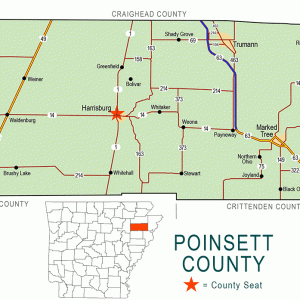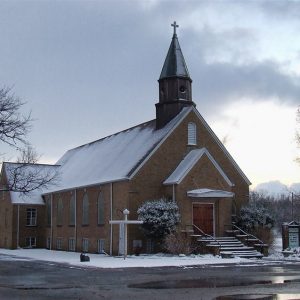calsfoundation@cals.org
Waldenburg (Poinsett County)
| Latitude and Longitude: | 35°33’55″N 090°56’01″W |
| Elevation: | 239 feet |
| Area: | 0.14 square miles (2020 Census) |
| Population: | 53 (2020 Census) |
| Incorporation Date: | August 15, 1958 |
Historical Population as per the U.S. Census:
|
1810 |
1820 |
1830 |
1840 |
1850 |
1860 |
1870 |
1880 |
1890 |
1900 |
|
– |
– |
– |
– |
– |
– |
– |
– |
– |
– |
|
1910 |
1920 |
1930 |
1940 |
1950 |
1960 |
1970 |
1980 |
1990 |
2000 |
|
– |
– |
– |
– |
– |
113 |
164 |
124 |
103 |
80 |
|
2010 |
2020 |
|
|
|
|
|
|
|
|
|
61 |
53 |
|
|
|
|
|
|
|
|
Waldenburg is an incorporated town in Owen Township of Poinsett County. Located west of Crowley’s Ridge, the town lies at the intersection of State Highways 14 and 49. It is located south of Weiner (Poinsett County) and approximately twenty-five miles from Jonesboro (Craighead County). Originally known as the German Settlement, then Bern, and later Youngville, Waldenburg was incorporated in 1958. Early in its settlement, the town was a small milling community predominately settled by German immigrants whose descendants still make up the majority of the population.
The construction of the St. Louis Southwestern Railway (commonly called the Cotton Belt) in 1881 established a firm foundation for the town, and many businesses began to appear. Waldenburg’s milling and agricultural economy soon began to take shape.
With this solidity came the establishment of a post office, general store, and hotel. Waldenburg’s first school house was soon erected west of town. The community would also be served by two other schools: Redmann and Uekena. Eventually, the three schools were consolidated into the Waldenburg School District, which remained active until 1972, when the district consolidated with Weiner’s district.
Albert Flusche, a German settler from Kansas, came to Waldenburg in the early 1890s to establish a Catholic colony, but he died before realizing his dream. Other German settlers soon came to Waldenburg. Before the railroad arrived, many of the immigrants worked as carpenters, hunted, or raised livestock. The introduction of the railroad broadened their employment outlook and the economy of the town.
Waldenburg was deeply affected by the Flood of 1927, along with most of eastern Arkansas. The area soon recovered, but the growth of the town stagnated.
A train wreck in 1951 spilled fuel and chemicals along the railroad, but the presence of snow on the ground helped to contain the spill to ditches along the tracks within the city limits.
Most of Waldenburg’s history is directly linked to the Zion Lutheran Church located west of town. Founded in 1881 in the Reinke family home, its original name was Deutsche-Evangelische Lutherische Zion Gemeinde Unveranderte Ausbergischer Confession of West Prairie. The church broke ground on a permanent building in 1882. The original building was destroyed by fire in the 1890s but was promptly repaired. In 1924, the church was reorganized with eighteen members and has been continuously active in the community since that time. The church saw growth under the leadership of the Reverend Frank J. Zirbel, who served the congregation for thirty years. In April 1953, the church was severely damaged by a tornado that also destroyed many homes and businesses, but it was again rebuilt.
The local economy is based mostly upon agriculture and related businesses. Before rice production became the most widespread farming practice in the area, most of the land was planted with corn, cotton, and wheat. Waldenburg is home to seed and equipment suppliers, as well as the Farmers Supply Association Cooperative, all serving the agricultural market. Due to its location near the Cache River and Earl Buss Bayou DeView Wildlife Management Area, Waldenburg is a popular destination for waterfowl hunters during the fall and winter.
Various hunting clubs and lodges routinely draw visitors from around the nation and the world to experience Waldenburg’s excellent duck hunting. Woody’s Barbeque, a local staple since the 1990s, serves award-winning barbeque at the intersection of Highways 14 and 49. Josie’s Steakhouse, located adjacent to Woody’s on Highway 49, is also an integral part of the community; the population of the town triples on winter weekends when the restaurant is open.
Waldenburg’s town records have twice been destroyed by fire. The town is served by the Weiner Police Department and the Poinsett County Sheriff’s Office.
For additional information:
Bowman, Steve. Arkansas Duck Hunters Almanac. Fayetteville, AR: Ozark Delta Press, 1998.
Poinsett County Historical Society. Poinsett County, Arkansas, Its History and Families. Paducah, KY: Turner Publishing, 1998.
Danny Aaron Russell
Weiner, Arkansas
 Poinsett County Map
Poinsett County Map  Zion Lutheran Church
Zion Lutheran Church 



Comments
No comments on this entry yet.